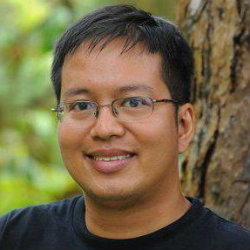UP launches Resilience Institute, spearheads open data for disasters

The University of the Philippines officially launched its Resilience Institute (UPRI) on Tuesday, June 20, at a formal ceremony at the UP Diliman Bahay ng Alumni.
In his opening speech, UPRI executive director Dr. Mahar Lagmay said that the Institute continues and expands on the work started by the Nationwide Operational Assessment of Hazards (Project NOAH), which he also previously headed.
The UPRI is tasked with providing the public with data for disaster prevention, response, and mitigation. Lagmay stressed that this data is, and should always be, free to the public.
"Ang disaster data at impormasyon ay dapat libre at accessible sa lahat," underscored Lagmay, to strong applause from the gathered audience.
"Sa panahon ng emergencies, data should be accessible. Aanhin mo ang datos at impormasyon kung hindi ito aabot sa tao kung kailan ito kinakailangan," he added.
Central to the UPRI is the Project NOAH Center, which will continue to develop disaster-response technology, complemented by "collaborative contributions" from the arts and humanities sectors.
"Kasama po natin dito... ang mga scientists at taong taga-sining. Sa mga sumusunod na taon ay iigting ang ating problema sa masungit na kalikasan (at) dapat tayong magsama-sama," he said.
The goal, according to Lagmay, is not just to provide free data but also to study how best to communicate this information to the public and develop a "culture of preparedness."
"(Kailangan ng) overall na pagpalit ng ating kultura para tayo'y mas maging handa," Lagmay noted.
The event was also graced by UP President Danilo Concepcion; guests of honor Senator Loren Legarda and Cong. Joey Salceda; and UP Diliman Chancellor Dr. Michael Tan, who gave the closing remarks.
Legarda, a UP alumna and climate action advocate, highlighted the UPRI's role in strengthening national security by helping alleviate the social pressures that breed social unrest.
"The two greatest threats to our security as a nation—and to the world!—are terrorism and climate change, and these are actually intertwined," she said. "The importance of changes in climate, poverty reduction and all the needs of our vulnerable population are related to hardships and challenges that breed terrorism."
Meanwhile, the DOST and PAGASA continue to benefit from the technologies developed by the original Project NOAH, which was turned over to the government last February.
"The outcome or result of Project NOAH is now due for use and adoption, specifically by PAGASA. Its adoption by PAGASA ensures the NOAH tools will be institutionalized," assured DOST Secretary Fortunato De la Peña at the time. — GMA News

Need a wellness break? Sign up for The Boost!
Stay up-to-date with the latest health and wellness reads.
Please enter a valid email address
Your email is safe with us






